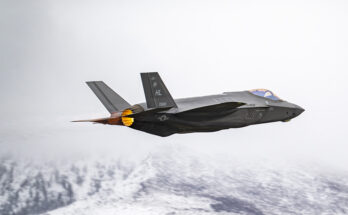Making official a long-rumored deal, Indonesia has announced an order for 42 French-built Dassault Rafale multirole combat aircraft, with a first phase firm order of six fighters. The signing ceremony occurred on February 10 in Jakarta, with Dassault chief executive Eric Trappier and Indonesian Air Vice Marshal Yusuf Jauhari inking the deal before the respective defense ministers of both countries.
Dassault did not disclose the cost of the order, but an official from the French Defense Ministry placed the deal’s value at $8.1 billion, which would appear to include crew training, logistical support, and a reported training center replete with a pair of full-mission simulators. Dassault did mention industrial participation as part of the sales package, which will involve technology imparted from Safran and Thales. Indonesia’s offset requirements for a major defense contract are currently around 45 percent of the overall value of a sale.
L’Indonésie s’équipe du #Rafale https://t.co/pEqm9yR5y9
Indonesia purchases the Rafale https://t.co/31yOXIUjhD pic.twitter.com/BVfs4HYg9o— Dassault Aviation (@Dassault_OnAir) February 10, 2022
The aforementioned first phase of the deal involves six Rafales to be delivered in the coming months, while the follow-on order and delivery of the remainder will be executed at a later date, possibly towards the end of this year or into 2023.
The big development in the fighter deal is the add-on Memorandum of Understanding (MoU) related to submarine cooperation, also signed on February 10 following a visit to Indonesian shipbuilder PT PAL by French shipbuilding prime Naval Group’s CEO, Pierre Eric Pommellet. This arrangement is expected to result in the order of two Scorpène-design diesel-electric submarines (SSKs) for the Indonesian Navy, which would fill part of the service’s larger 12-submarine capacity requirement. The Indonesian Navy lost one of its two German-built Type-209 design Cakra class submarines, KRI Nanggala, when it sank in the Bali Sea back in April 2021, thereby leaving just four total submarines in its fleet.
For France, the likelihood of a submarine export contract in the Asia Pacific region represents a consolation of sorts following the loss of a multibillion-dollar submarine sale to Australia last year.
Several other MoUs were also inked between the two countries, covering French defense equipment or assistance in areas such as satellites and ammunition. Taken altogether, the trip to Jakarta by French Defense Minister Florence Parly and her entourage has proved a very fruitful one for French security and industrial outreach in Southeast Asia.
But the key element in the burgeoning France-Indonesia defense relationship is the Rafale sale.
The Indonesian National Defense-Air Force (TNI-AU) is engaged in a long-term strategy aimed at modernizing its fighter fleet through the upgrading of existing assets and expanding its capabilities through procurement of modern platforms.
This effort dates back to phase one of the Minimum Essential Force (MEF) program undertaken from 2009 through 2014. The goal initially was to recapitalize the Air Force’s fighter fleet, which fell into disrepair following the arms embargoes the U.S. and the European Union imposed on the country in 1999.
Once the last of these bans was lifted in 2005, the Air Force continued to suffer from under-investment, leaving its mixed fighter fleet to atrophy further.
This has left the Indonesian Air Force’s original goal of fielding 180 fighter jets by 2024 dead in the water, while the Defense Ministry’s shorter-term, more reachable goal of acquiring 100 new fighters (thereby enabling the TNI-AU to operate 170 fighters by around 2024-2025) is also treading uphill.
But the Rafale procurement marks a key first step in this process.
In a bit of a twist, the French combat aircraft sale emerged as a direct result of U.S. foreign policy.
With the retirement of its legacy fleet of F-5 Tigers, the Indonesian Air Force and Defense Ministry looked to acquire up to 11 Russian-designed and -built Sukhoi Su-35s as a replacement. With the Indonesian Air Force already operating a mixed Sukhoi fleet of Su-27s and Su-30s since 2003, plus Russia appearing willing to conduct a sale via countertrade for local palm oil and other commodities, the procurement course appeared a natural one.
Yet, despite an announcement on February 14, 2018, of an agreement to procure the 11 Su-35s at a cost of $1.14 billion under a cash and commodity deal (items such as palm oil, coffee, tea, and rubber were offered up by Indonesia), no firm contract emerged. Instead, largely due to Indonesian concerns about U.S. CAATSA (Countering America’s Adversaries Through Sanctions Act) legislation regarding defense and/or intelligence-related transactions with Russia, this agreement was ultimately dropped.
With the Su-35 no longer an option due to U.S. pressure, Indonesia turned elsewhere to fill the capacity gap created by the retirement of the F-5s. Two options emerged: the Dassault Rafale and the Boeing F-15EX Advanced Eagle.
A preamble contract involving the procurement of 36 Rafales at the cost of EUR5.8 billion ($6.56 billion) was then signed on June 7, 2021.
Then, in December, Indonesia’s Air Chief Marshal Fadjar Prasetyo stated that a fighter choice between the Rafale and F-15EX remained pending, contra to an earlier comment he made suggesting a possible split buy of both fighter types (36 Rafales and eight F-15EXs).
But by January 20, 2022, Defense Minister Prabowo Subianto had announced to reporters that negotiations for the Rafale purchase were complete and that a contract merely awaited the “activation” that finally came on February 10.
No indications have followed regarding a potential deal for a smaller batch purchase of F-15EXs, nor a long-rumored purchase of up to two squadrons of new-build Lockheed Martin F-16 Block 72 Viper jet fighters.
The Indonesian Defense Ministry’s financial bandwidth – even via foreign loan assistance, a traditionally utilized avenue – appears to be too limited at the current moment to splash out on multiple combat aircraft purchases.
Instead, this current moment belongs to Dassault and the inexhaustible defense export efforts of France.
UPDATE: The Pentagon’s Defense Security Cooperation Agency (DSCA) issued a notice to Congress later on February 10 announcing U.S. State Department approval of a proposed Foreign Military Sale (FMS) package involving 36 F-15ID fighters, plus associated systems and equipment, with an estimated $13.9 billion price tag. Whether this is part of a larger-planned Indonesian buy or merely a formality in a longstanding prospective deal has yet to be publicly determined. Should this proposed FMS deal be acted upon by Indonesia it would likely involve Foreign Military Financing (FMF) assistance from Washington, even if ultimately reduced in scale from the announced proposal.
Dan Darling is Forecast International’s director of military and defense markets. In this role, Dan oversees a team of analysts tasked with covering everything from budgeting to weapons systems to defense electronics and military aerospace. Additionally, for over 17 years Dan has, at various times, authored the International Military Markets reports for Europe, Eurasia, the Middle East and the Asia-Pacific region.
Dan's work has been cited in Defense News, Real Clear Defense, Asian Military Review, Al Jazeera, and Financial Express, among others, and he has also contributed commentary to The Diplomat, The National Interest and World Politics Review. He has been quoted in Arabian Business, the Financial Times, Flight International, The New York Times, Bloomberg and National Defense Magazine.
In addition, Dan has made guest appearances on the online radio show Midrats and on The Media Line, as well as The Red Line Podcast, plus media appearances on France 24 and World Is One News (WION).




